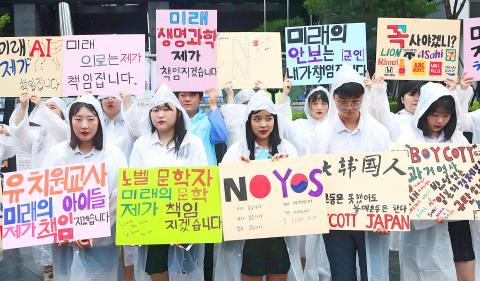Japanese officials yesterday said that they are pursuing procedures to downgrade South Korea’s preferred nation status as Tokyo expands export controls over sensitive materials.
The Japanese Cabinet is set to approve as early as Aug. 2 a plan to drop South Korea from a list of 27 countries granted preferential trade status, Japanese media reported.
Japanese Chief Cabinet Secretary Yoshihide Suga did not confirm the date, but said that Japan is going ahead as planned.

Photo: EPA-EFE
The delisting would take effect three weeks after the Cabinet’s approval. That would be on about Aug. 23.
“As we have been saying all along, a planned removal of South Korea’s ‘white nation’ status is an appropriate measure in order for Japan to effectively carry out export controls,” Suga said.
On July 4, Japan began requiring case-by-case export licenses for exports to South Korea of three materials used in high-tech devices.
Tokyo also announced plans to drop South Korea from its list of countries allowed preferential trade status, pending “public comments” and Cabinet approval.
Officials are studying opinions sent to the government during the “public comment” period that ended on Wednesday, a required step that is largely a formality.
More than 10,000 opinions were submitted, including one from the South Korean government defending its export controls, Japanese Ministry of Economy, Trade and Industry officials said.
The majority of the senders supported stripping South Korea of preferential status, the officials said.
South Korea has objected to Japan’s tightening of the export policy, alleging that Tokyo is using trade issues as a weapon to retaliate over court procedures demanding Japanese companies pay compensation to south Korean victims of harsh wartime labor.
South Korea also says the curbs are unnecessary, one-sided and harmful to free trade.
The trade flap is an extra irritant in the troubled relationship between the two neighbors, which has long been strained by antagonism left over from Japan’s colonization of the Korean Peninsula in 1910-1945.

The Eurovision Song Contest has seen a surge in punter interest at the bookmakers, becoming a major betting event, experts said ahead of last night’s giant glamfest in Basel. “Eurovision has quietly become one of the biggest betting events of the year,” said Tomi Huttunen, senior manager of the Online Computer Finland (OCS) betting and casino platform. Betting sites have long been used to gauge which way voters might be leaning ahead of the world’s biggest televised live music event. However, bookmakers highlight a huge increase in engagement in recent years — and this year in particular. “We’ve already passed 2023’s total activity and

Nvidia Corp CEO Jensen Huang (黃仁勳) today announced that his company has selected "Beitou Shilin" in Taipei for its new Taiwan office, called Nvidia Constellation, putting an end to months of speculation. Industry sources have said that the tech giant has been eyeing the Beitou Shilin Science Park as the site of its new overseas headquarters, and speculated that the new headquarters would be built on two plots of land designated as "T17" and "T18," which span 3.89 hectares in the park. "I think it's time for us to reveal one of the largest products we've ever built," Huang said near the

China yesterday announced anti-dumping duties as high as 74.9 percent on imports of polyoxymethylene (POM) copolymers, a type of engineering plastic, from Taiwan, the US, the EU and Japan. The Chinese Ministry of Commerce’s findings conclude a probe launched in May last year, shortly after the US sharply increased tariffs on Chinese electric vehicles, computer chips and other imports. POM copolymers can partially replace metals such as copper and zinc, and have various applications, including in auto parts, electronics and medical equipment, the Chinese ministry has said. In January, it said initial investigations had determined that dumping was taking place, and implemented preliminary

Intel Corp yesterday reinforced its determination to strengthen its partnerships with Taiwan’s ecosystem partners including original-electronic-manufacturing (OEM) companies such as Hon Hai Precision Industry Co (鴻海精密) and chipmaker United Microelectronics Corp (UMC, 聯電). “Tonight marks a new beginning. We renew our new partnership with Taiwan ecosystem,” Intel new chief executive officer Tan Lip-bu (陳立武) said at a dinner with representatives from the company’s local partners, celebrating the 40th anniversary of the US chip giant’s presence in Taiwan. Tan took the reins at Intel six weeks ago aiming to reform the chipmaker and revive its past glory. This is the first time Tan